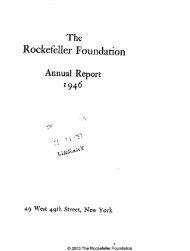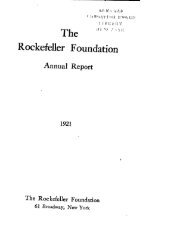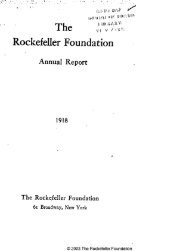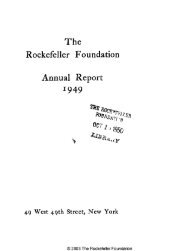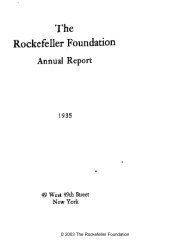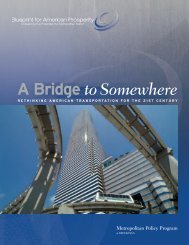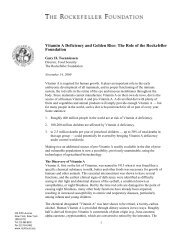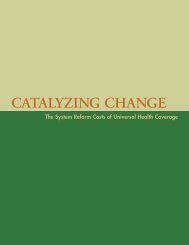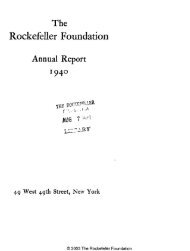Strong Ministries for Strong Health Systems - The Rockefeller
Strong Ministries for Strong Health Systems - The Rockefeller
Strong Ministries for Strong Health Systems - The Rockefeller
Create successful ePaper yourself
Turn your PDF publications into a flip-book with our unique Google optimized e-Paper software.
to strengthen national academies of medicine and science as providers of expert advice on health and science policy are<br />
limited, but several African countries are making strides in this area. Demand must be created among policy makers and<br />
politicians to foster an environment where evidence-based initiatives become the norm.<br />
<strong>The</strong> many roles of academia: educating the work<strong>for</strong>ce, sharing data and expertise<br />
Most ministers (n=16) described academia (national and overseas) as providing essential support in education of the health<br />
work<strong>for</strong>ce, including both ministry and community-based personnel. Academic institutions can also provide access to and<br />
analysis of data, technical training, general human resources development, and specific health program development.<br />
Few ministers (n=3) described the relationship with academia as either not helpful or nonexistent. <strong>The</strong> ministry-academic<br />
partnerships seemed particularly strong in middle income countries.<br />
While a key resource, these collaborations were also<br />
described as complicated by the fact that academic institutions,<br />
and their faculty, may have divergent interests<br />
and priorities that are sometimes disconnected from<br />
specific country health needs. Alternatively, they may<br />
be strong in traditional infectious disease research areas<br />
long supported by global funding institutions, but weak<br />
in health services and health policy research capabilities.<br />
More likely, however in many LICs, the academic<br />
sector like the health sector is under-resourced. Faculty<br />
members often have multiple jobs due to the low pay in<br />
the university, leaving them little time to focus on public<br />
concerns. All of these factors make timely responses to<br />
ministry needs difficult.<br />
We’ve really built the health system together. <strong>The</strong> university<br />
role was to think critically about the issues<br />
and the health service; they’ve been very generous<br />
with their resources.…We are now working on building<br />
a school of health governance with a local campus<br />
that would represent a consortium among 12 Latin<br />
American countries. This would focus on creating<br />
managers of health and <strong>for</strong>eign affairs, education<br />
and planning, with a health sensibility. <strong>The</strong>re would<br />
be both short and long term courses as well as undergraduate<br />
and graduate certificates. –FMOH<br />
Relations with universities are good but slow in their decision making. <strong>The</strong>y’re weak in health services research and<br />
health policy research, although now those fields are increasing with younger professionals. –MOH<br />
<strong>The</strong>re’s not enough emphasis on research in lower-income countries, so it’s hard to get in<strong>for</strong>mation on what works and<br />
doesn’t work. <strong>The</strong> real need is <strong>for</strong> academic research and clinical and operational research. If that were easily accessible,<br />
it would be helpful. Creating a virtual observatory that could be broadly accessible to government and the public<br />
would be invaluable. And most useful would be resources, or a place to discuss best practices with in-depth case studies<br />
comparing what we’re doing and successes we have had. –FMOH<br />
Although most references to academia focused on in-country facilities, overseas resources were used and valued as well.<br />
<strong>The</strong>y helped us a lot; both local and academics from the global north can be very helpful in developing countries. <strong>The</strong>re<br />
needs to be a resource center that can help us network and identify what's best suited <strong>for</strong> our needs. We are building<br />
skills <strong>for</strong> everyone not just providing advanced degrees. We would also like to see academics enlisted in steering research<br />
in health policy, health services research, and creating centers of excellence in areas needed by the <strong>Ministries</strong><br />
to improve the health system. –FMOH<br />
Expressing an alternative view, one stakeholder described a perceived government preference <strong>for</strong> using overseas rather<br />
than internal academic resources, so as not to seem weak.<br />
For political reasons they may not wish to be seen as using local people. For solutions, they often bring in<br />
special advisors or expert consultants who really have no good knowledge of the context. <strong>Ministries</strong> need<br />
to be capable of drawing advice from wherever it’s helpful and be assured that it’s okay to do so. Sometimes<br />
they don’t know what they have in the ministry and what’s available in the country. —Stakeholder, Academic<br />
18 <strong>Strong</strong> <strong>Ministries</strong> <strong>for</strong> <strong>Strong</strong> <strong>Health</strong> <strong>Systems</strong>



